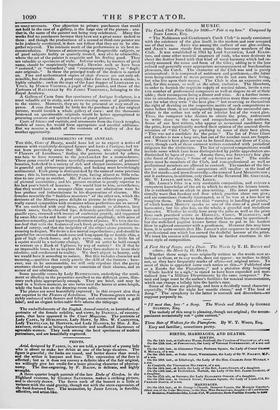MUSIC.
The Catch Club Prize Glee for I836—" Fair is my love." Composed by JOHN LODGE, Esq.
" The Noblemen and Gentlemen's Catch Club" is nearly coexistent with the existence of the glee itself, in the modern and now accepted use of that term. ARNE was among the earliest of our glee-writers, and ARNE'S name stands first among the honorary members of the Club. It was established in 1761 by Lord SANDWICH, Lord EGLIN- TON, and some other musical amateurs of rank, who were desirous to cheer the festive board with that kind of vocal harmony which had re- cently assumed the name and form of the Glee ; adding to it the less refined anti generally more appropriate accompaniment of bacchanalian pleasures, the Catch. The character of the Club was and is purely aristocratical : it is composed of noblemen and gentlemen,—the latter term being construed to mean persons wbo do not earn their living, but who live upon their means. The Club is also an expensive one, and, for this reason, as well as the other, exclusive. The Members, in order to furnish the requisite supply of musical talent, invite a cer- tain number of professional composers as well as singers to sit at their table ; their recompense being a dinner and wine. As a further incen- tive to attendance, they give a prize—sometimes more than one—every year for what they term "the best glee :" but reserving to themselves the right of deciding on the respective merits of such compositions as conic before them, it not unfrequently happens that the successful can- didate is the author not only of an inferior but of the worst glee. Thus, the composer who desires to obtain the prize, endeavours to write down to the taste and comprehension of his auditors. Some of our best writers, who appear as occasional candidates for the prize, have significantly marked their opinion of the musical discri- mination of "the Club," by prefixing to some of their best glees, "This was not a candidate for the prize." The list of Prize Glees and Catches is now a long one, but out of the number most are forgot- ten : WEBBE'S best glees are not to be found there, nor those of Cam, corn, though each of these eminent writers contended with periodical diligence for the distinction. The list of rejected compositions would include some which have been distinguished by public approbation un- diminished by lapse of years. Among these, was STEVENS'S fine glee (the finest of its class), " Some of my heroes are low." The candi- dates must be members of the Club, and non-professional as well as professional members are allowed to contend. The number of the for- mer is small—of successful competitors still smaller : at the head of the list stands—and most deservedly—the name of Lord MORNINGTON ; and it embraces, in addition, only those of the Reverend Mr. GREVILLE, Mr. W. LINLEY, and now, Mr. LODGE.
Mr. LODGE'S Glee is a very creditable composition, and evinces a competent knowledge of the art to which he devotes his leisure hours. He is evidently not an adept in glee-writing. His inner parts occa- sionally want that freedom and flow which practice alone can give; and are sometimes clumsily interrupted, as if he was at a loss how to complete them. He wants also that "cunning in handling of points," of which honest MORLEY speaks as one of the aims of a good vocal harnionist ; but his glee has, on the whole, a graceful and melodious character. Whether he really bore away the palm as well as the prize from such practised artists as HORSLEY, COOKE, WALMISLEY, and ELLIOT—supposing them to have done their best—may be questioned : but the well-bred pugilist knows better them to put in his hardest blow in a gloved encounter with a gentleman. However this may have been, it is quite certain that Mr. LODGE'S glee surpasses in merit many a professional one which has earned the doubtful honour of the prize. We trust his success will encourage him to further exertions in the same style of composition.


























 Previous page
Previous page